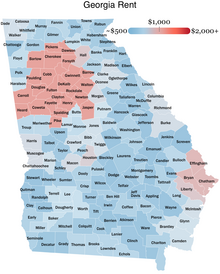This is the current revision of this page, as edited by Gjs238 (talk | contribs) at 12:09, 3 January 2025 (- parent categories). The present address (URL) is a permanent link to this version.
Revision as of 12:09, 3 January 2025 by Gjs238 (talk | contribs) (- parent categories)(diff) ← Previous revision | Latest revision (diff) | Newer revision → (diff)| This article relies excessively on references to primary sources. Please improve this article by adding secondary or tertiary sources. Find sources: "Housing in Georgia" U.S. state – news · newspapers · books · scholar · JSTOR (January 2025) (Learn how and when to remove this message) |
Housing in Georgia takes a variety of forms, from single-family homes to apartment complexes. Georgia had a homeownership rate of 61.6% in 2017. Issues related to housing in Georgia include homeownership, affordable housing, housing insecurity, zoning, and homelessness.

Background
According to the U.S. Census Bureau, there were 4,410,956 housing units in Georgia in 2020. There were an estimated 10,234 homeless individuals in Georgia in 2020, according to the Annual Homeless Assessment Report.
The U.S. Department of Housing and Urban Development administers programs that provide housing and community development assistance in the United States. Adequate housing is recognized as human right in the 1948 Universal Declaration of Human Rights and in the 1966 International Covenant on Economic, Social and Cultural Rights.
References
- Kiersz, Andy. "Here's how many people own their homes in every state". Business Insider. Retrieved 2025-01-01.
- "2020 Census Demographic and Housing Characteristics File (DHC)". United States Census Bureau. Retrieved 2025-01-01.
- "The 2020 Annual Homeless Assessment Report (AHAR) to Congress" (PDF). United States Department of Housing and Urban Development. Retrieved 2024-12-31.
- "U.S. Department of Housing and Urban Development (HUD) | USAGov". www.usa.gov. Retrieved 2025-01-01.
- "The human right to adequate housing". Office of the United Nations High Commissioner for Human Rights. Retrieved 2025-01-01.